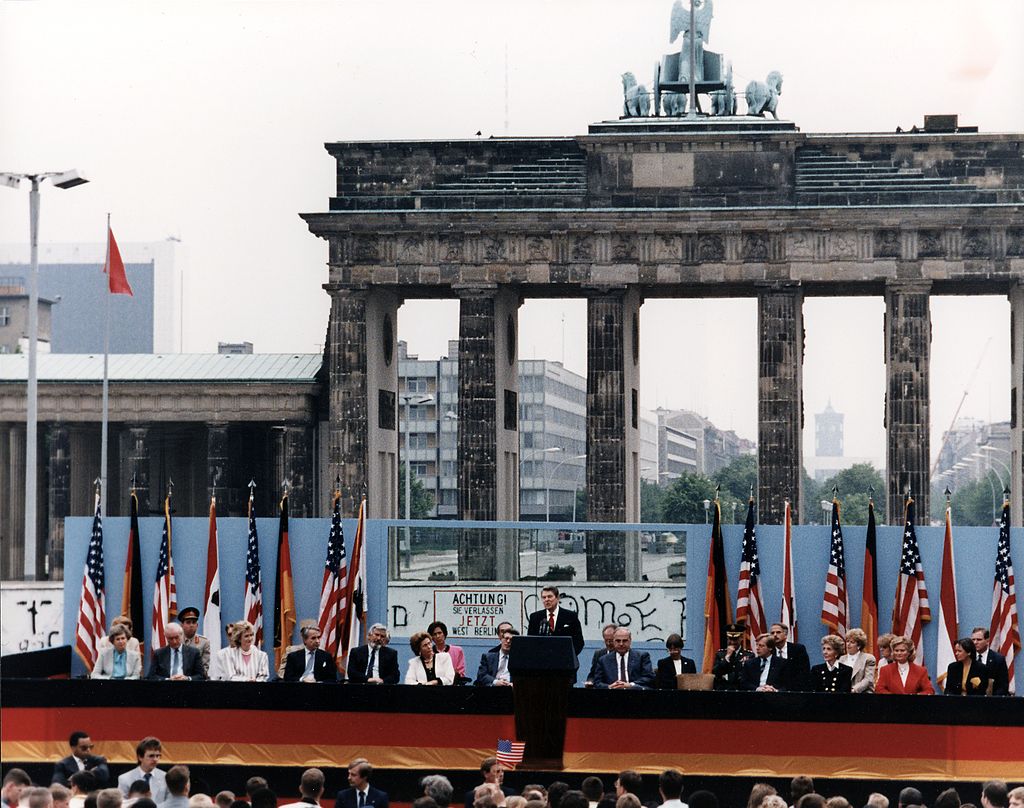Thirty years ago this month, there occurred one of those amazing historical moments that stunned the world. The Berlin Wall ceased to exist:
On November 9, 1989, as the Cold War began to thaw across Eastern Europe, the spokesman for East Berlin’s Communist Party announced a change in his city’s relations with the West. Starting at midnight that day, he said, citizens of the GDR were free to cross the country’s borders. East and West Berliners flocked to the wall, drinking beer and champagne and chanting ‘Tor auf!’ (‘Open the gate!’). At midnight, they flooded through the checkpoints.
Within days, some of those shouting “Tor auf!” took pickaxes to the wall, knocking down the barbed wire and concrete that had separated East and West Berlin for decades. Tens of millions worldwide celebrated the beginning of the end of communism in East Germany.
Within weeks, communism in Eastern Europe and the Soviet Union began to die. In Poland, Hungary, Czechoslovakia, Bulgaria, Albania, and Romania, communist regimes fell to stouthearted freedom fighters. Two years later, the Soviet Union itself was voted out of existence by the Supreme Soviet.
This collapse seemed to signal the end of communism and socialism worldwide. Western liberal values, many believed, would reign triumphant, and democracy would spread among the nations of the world.
Alas, no.
Governments in countries such as Cuba, North Korea, China, and Venezuela remain communist. Other nations are dictatorships of one kind or another. Meanwhile, the ideas of communism and socialism continue to survive in many other countries, including the United States.
Look, for example, at some of today’s presidential candidates. Despite a booming economy, many of them savage capitalism. They demand the federal government take greater control of our market system. Candidates like Bernie Sanders and Elizabeth Warren no longer fear being labeled socialists, instead embracing the name, and proposing programs for medical care, education, and our environment that, if enacted, would bankrupt an America already deeply in debt.
These politicians are emboldened because they have discovered their ideas appeal to a large segment of voters, especially younger ones. These voters are products of an educational system teaching socialism and political correctness. They want the freebies promised by such politicians, believe the hysteria about global warning, and dream that a centralized state might bring about heaven on earth.
On October 27, a man died who knew first-hand the foolishness of utopian dreams. Vladimir Bukovsky had long opposed the corrupt governments of the Soviet Union and the Russia that emerged from the fallen USSR. Bukovsky was a brave man, a dissident who suffered for his beliefs but who never yielded an inch to dictators.
Years ago, Bukovsky predicted that political correctness in the West, along with the overturning of tradition, would lead to ruination and repression of human rights. In his lecture “Can Political Correctness Be Worse Than Leninism?” he makes statements about feminism, grievance culture, Western political corruption, and American social experiments, that would likely brand him today as some sort of radical right-winger. Near the beginning of that lecture, Bukovsky offered these thoughts on 1989 and the continued rise of socialism:
But what happened after the collapse of communism? All over the world, especially in Europe, left wing politicians and parties come to power. Therefore, the move was clearly to the left, which seems illogical to me. Moreover, no hopes cherished back in 1989 (which were so high) ever came true. Communism survived. Francisco Fukuyama could have said that it was the end of history, but history proved otherwise – Cuba, Vietnam, China, North Korea remained communist. And in the very post-communist countries the processes did not go too far either. All what happened there were in fact cosmetic, exterior changes. Several personalities were replaced with others, who also happened to come from the communist establishment. Those countries appeared to be not free, but rather densely meshed by the remains of the nomenclature (communist establishment). But it was what happened in the West that surprised me most. It is at this time that the utopian ideologies appeared in the West. If we were to pinpoint when political correctness came into being, I could specify precisely – it came into being at the beginning of the nineties of the 20th century.
“Utopian ideologies” remain alive and well in the United States. Our present presidential candidates seem in a race to outdo one another with their unhinged proposals. As for the political correctness Bukovsky addresses, here too our system has taken on the face of dictatorship. Suggest that transgendered men should be disqualified from playing women’s sports, and you will be labeled a bigot. Raise concerns about co-ed combat outfits in our military, and you will be dismissed as a misogynist. Stick up for the Second Amendment, and you are a terrorist.
The fall of the Berlin Wall and the freedom that followed for Eastern European countries deserves celebration, but what if Bukovsky and others are correct? What if homegrown communists and socialists are eroding our own liberties?
—
[Image Credit: Wikipedia Commons-Reagan White House Photographs]
















Leave a Comment
Your email address will not be published. Required fields are marked with *